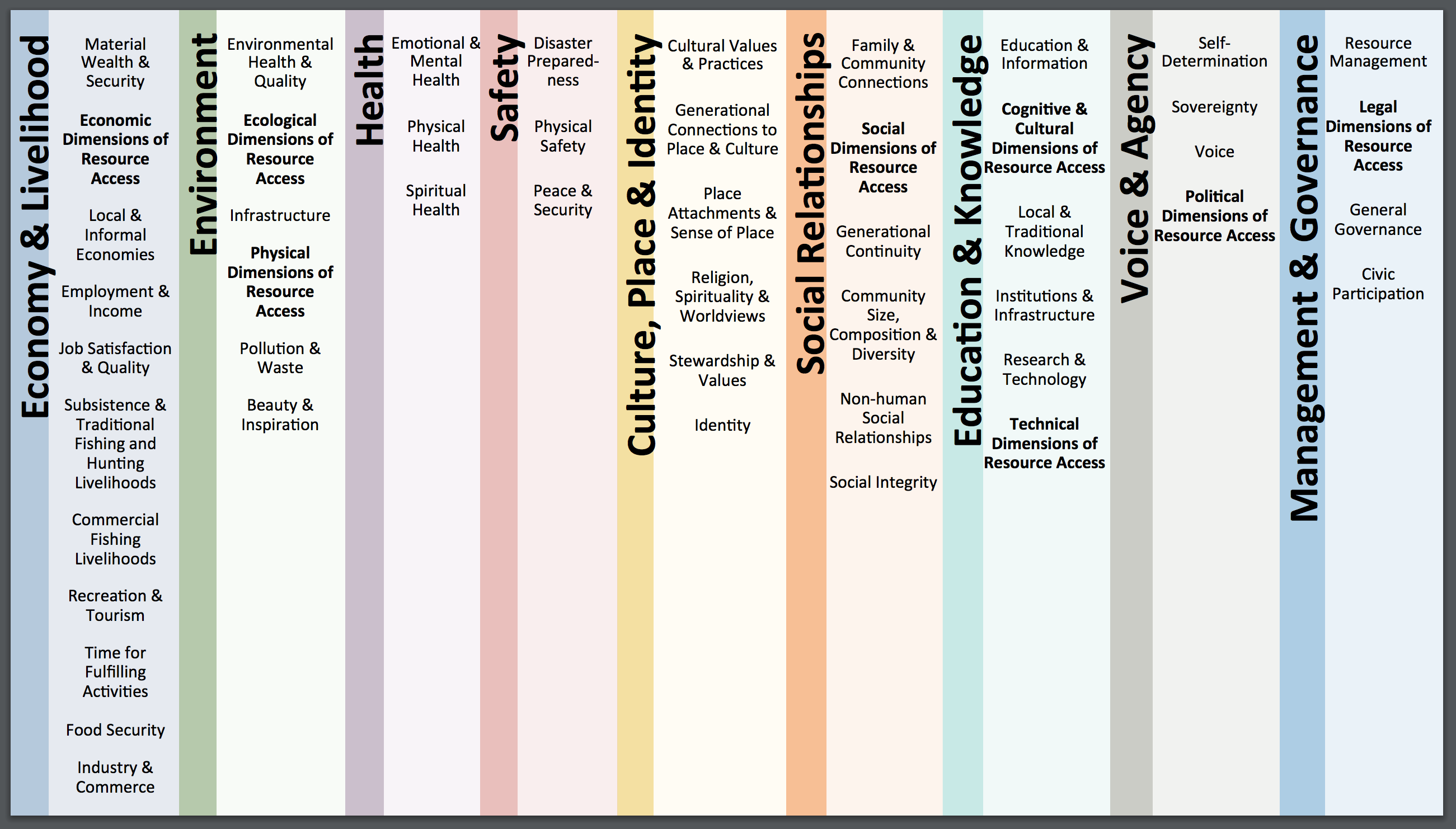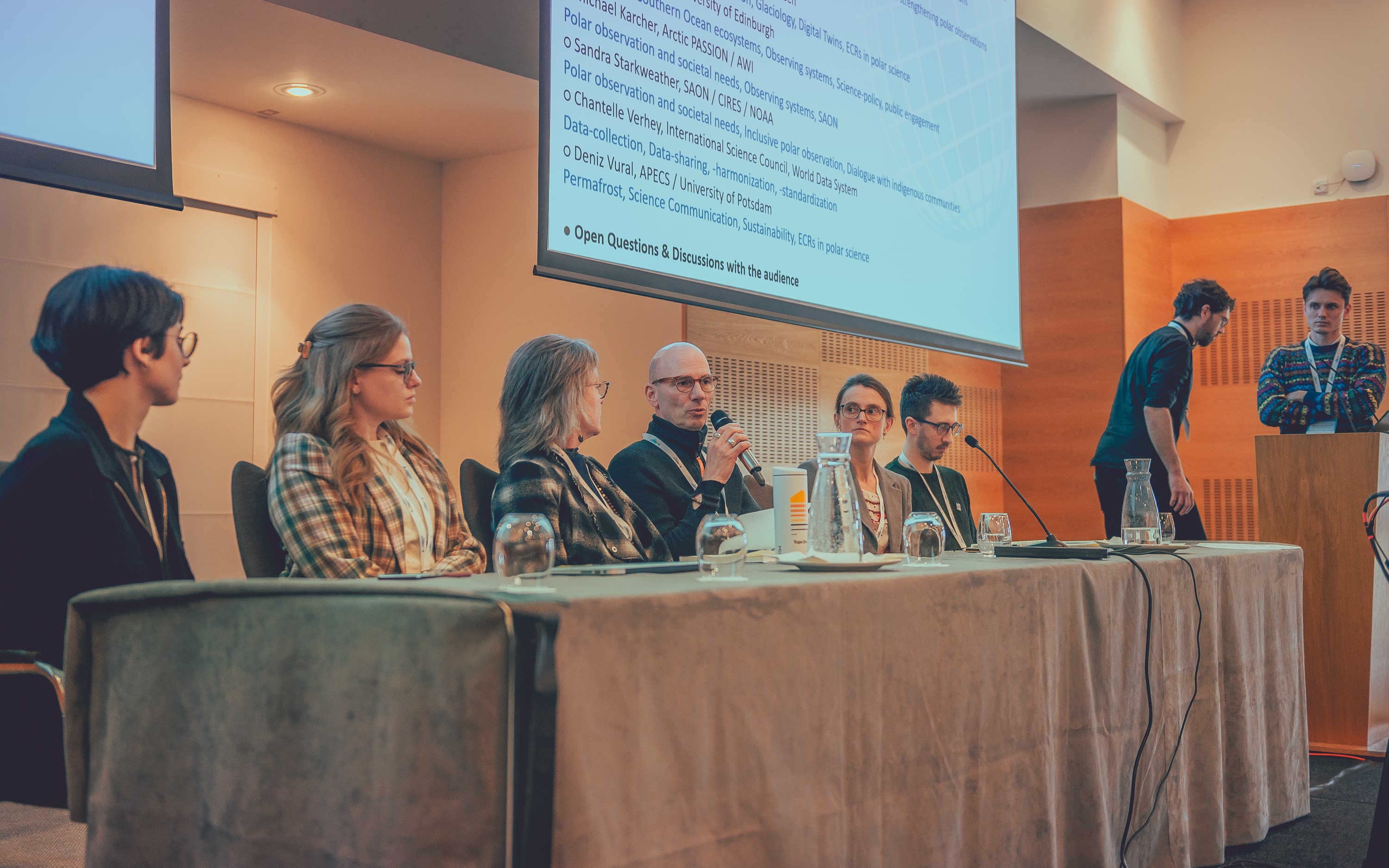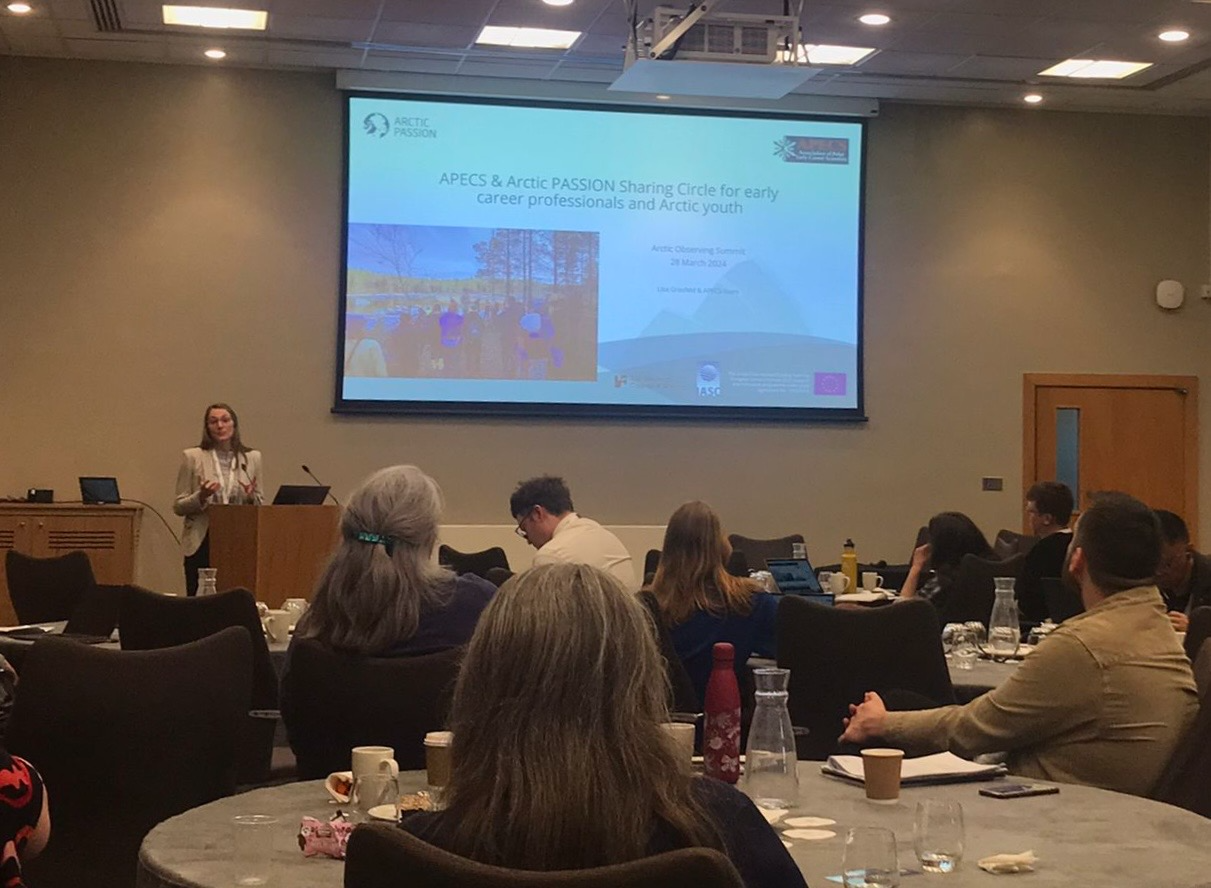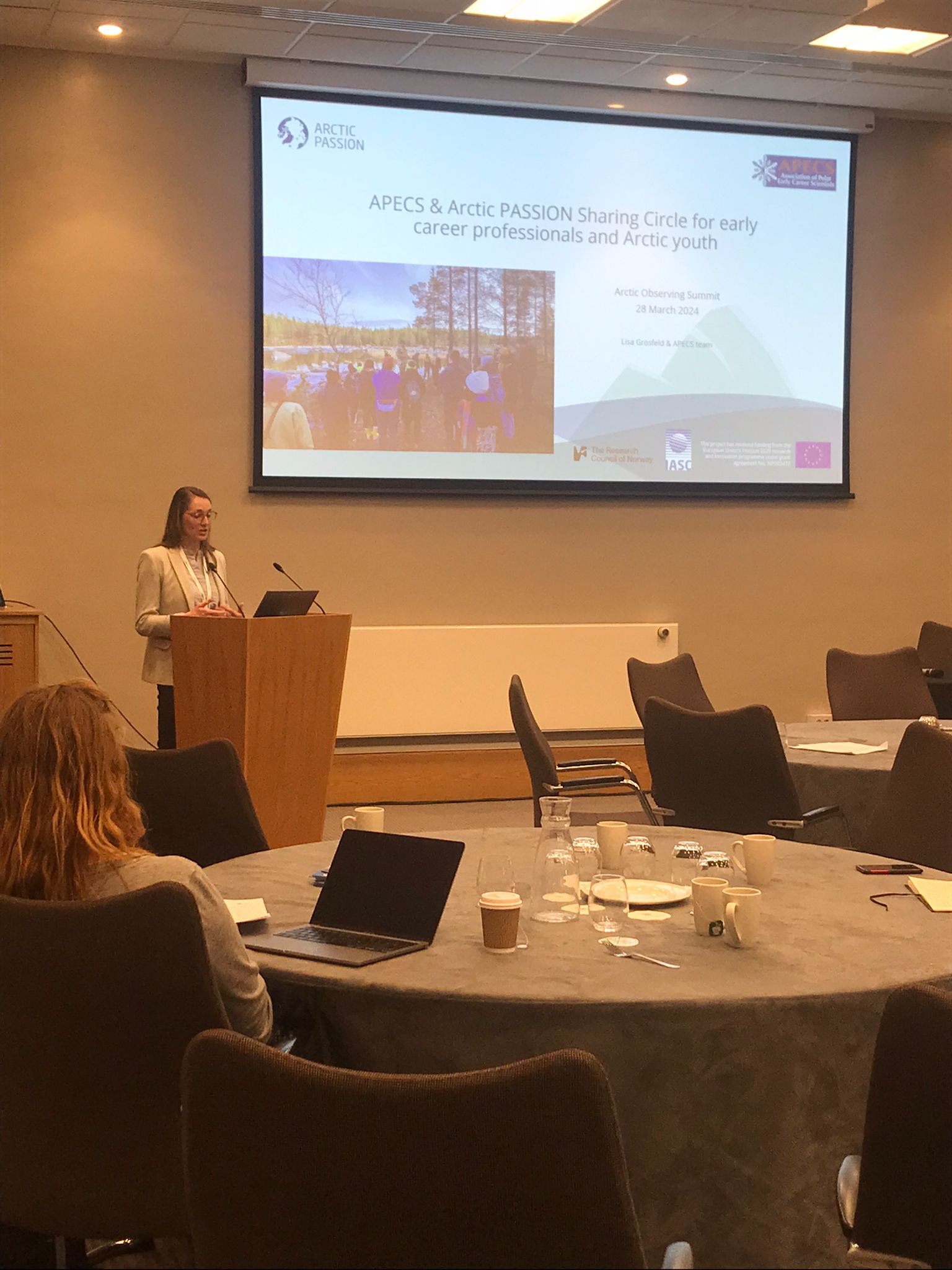The Arctic Science Summit Week (ASSW) is organised annually by the International Arctic Science Committee (IASC) to provide opportunities for coordination, cooperation and collaboration between the various scientific organisations involved in Arctic research. It was initiated by the IASC in 1999 and has evolved into the most important annual gathering of the Arctic research organisation.
In even number years the ASSW includes the Arctic Observing Summit (AOS), a high-level, biennial summit that aims to provide community-driven, science-based guidance for the design, implementation, coordination and long-term operation of Arctic observing systems. Arctic Science Summit Week 2024 happened in Edinburgh, Scotland from March 21st-29th. Arctic PASSION was involved in many of the ASSW sessions, including
- High-latitude Fires, Arctic Climate, Environment, and Health (HiFACE 3)
- Joint Community Meeting for the pan-Arctic network of Distributed Biological Observatories (DBOs)
- Joint (Cross-Cutting) IASC Working Groups meeting
- IASC Social & Human Working Group meeting
- IASC Social & Human Working Group meeting
- Arctic Regional Ocean Observing System (Arctic ROOS) Community meeting
- Equality, Diversity and Inclusion in Polar Science - sharing best practise
- Roadmap for Arctic observing and data systems (ROADS) process
- Indigenous Participation in SAON's Arctic ROADS
- EU Polar Cluster: Coordination and networking for Polar cooperation projects
and sessions at the AOS in which Arctic PASSION was contributing included:
- Plenary: Equity in Arctic Observing: Identify Systemic Hurdles and Approaches to Achieving Equity in International Arctic Observing Efforts
- WG2 'Data Sharing', WG3 'System Implementation and SAON ROADS' and WG4 'Observing System Benefits'
- Toward equitable Arctic Observing Systems – tracking human well-being and advancing environmental observations through societal and intersectional lenses
- Plenary: Keynote presentation on wildfire observing needs identified during the SAON ROADS Expert Panel process
- Making an inclusive and holistic Arctic Observing system through inclusion of diverse knowledge systems - how to progress?
- Co-designing a pan-Arctic ocean observing alliance (part I)
- Guiding Observing Network and Data System Development with Societal Impact Approaches: A Dialog Toward Establishing an Arctic Community of Practice
- Co-designing a pan-Arctic ocean observing alliance (part II)
- Understanding the value of capacity sharing in Arctic research: Progress, lessons learned, and next steps from the AOS Capacity Sharing Working Group
- Launch of the EUPolarnet2 White Paper with recommendations to accelerate the development of a sustained and fully integrated Polar observing system
- Wildfire Shared Arctic Variable
Below is a firsthand account of some of the sessions.
An account written by Arctic PASSION's Scientific Coordinator, written by Michael Karcher
On the first day of the ASSW Arctic PASSION co-organized the third meeting of HiFACE (High latitude Fires, Arctic Climate, Environment and Health 3) jointly with the Leverhulme Centre for Wildfires, Environment and Society, the ACRoBEAR project, PACES and Arctic Voices.
The focus of the well attended sessions had been an exchange on our current understanding of the interactions between climate systems, ecosystems, and society, as well as on the identification of knowledge gaps. Themes tackled were: Earth system interactions and feedbacks, Challenges with remoteness, climate vulnerability and resilience and adaptation. In the follow up we will develop recommendations for an interdisciplinary research agenda, and the team is working on a scientific paper.

Adriana Ford (Leverhulme Wildfire Centre) and Mikko Strahlendorf (FMI, Arctic PASSION) in the HiFACE 3 session. Photo: Michael Karcher
The AOS started with a plenary session themed 'Equity in Arctic Observing: Identify Systemic Hurdles and Approaches to Achieving Equity in International Arctic Observing Efforts' with statements and discussions from three excellent panellists
who each set the scene for the topic of equity, which was picked up by a large number of sessions in the following days. The session was organized by our partner project RNA CoObs and moderated by Arctic PASSION coordinator Michael Karcher. The panellists pointed out where they see the great need for more equity, as well as the tremendous gain if we make it happen. They discussed the systemic hurdles as well as the personal responsibilities for making progress. Examples for important issues mentioned in this context were to increase access and literacy, as well as sovereignty, in the data realm, the realization that if we want to make Arctic observing useful for all people, we all need to take on board that others are different from ourselves and include their voices and their leadership as well. The need for planning grants to include Indigenous partners into proposals in an equitable way, the funding of local research structures and the need for changes in the mismatching timelines of research projects versus the needs for building and keeping trustful relationships with Indigenous Peoples and local communities, were stressed.

The panellists and the moderator for the 'Equity' session. Photo: Charlotte Gehrke
Discussing about how science and Indigenous Knowledge can both be used jointly in Arctic observing to advance our understanding had been the theme of a session Arctic PASSION had organized together with the Tribal Government of St. Paul Island, named 'Making an inclusive and holistic Arctic Observing system through inclusion of diverse knowledge systems - how to progress?'. The four experienced panellists who shared examples for such approaches were:
- Hanah-Marie Garcia (Indigenous Sentinels Network): "Empowering Indigenous-Led environmental monitoring and Collaboration"
- Camilla Brattland (UiT - The Arctic University): ‘Transforming local and traditional knowledge into usable data. Challenges and solutions from work with coastal and Sami communities in Norway’
- Rowenna Gryba (ICC, University British Columbia): ‘Co-creating species habitat models with Indigenous Knowledge and statistics’
- Bruce Forbes (University Lapland): ‘Arctic Observing during rapid climate and land use change in Arctic social-ecological systems: An emphasis on Northwest Eurasia’
The panellists presented excellent examples of co-created research with joint involvement of Indigenous and Traditional Knowledge and science. Challenges that were discussed are for example the availability of adaptable technologies, infrastructure inequities, very different levels of capacity to initiate, participate and benefit from monitoring activities, the need for more boundary spanning network and clear protocols. Other issues to work on are the unfamiliarity of many scientists with Indigenous Knowledge and the danger of misperceptions, the difficulty of an unavoidable reduction of the complexity of Indigenous and Traditional Knowledge when data are to be made relevant for policy and interoperable with scientific data. In the session we identified the need for nation states and the EU to strengthen protections for Indigenous Peoples and local Arctic livelihoods via participatory policy design.
'Toward equitable Arctic Observing Systems – tracking human well-being and advancing environmental observations through societal and intersectional lenses', written by Tahnee Prior
On the afternoon of Day 1, the session “Toward equitable Arctic Observing Systems – tracking human well-being and advancing environmental observations through societal and intersectional lenses'', moderated by Michael Karcher (AWI) and Tahnee Prior (Women of the Arctic) built on the theme of the AOS plenary on "Equity in Arctic Observing" to unpack both definitions of well-being and trace the legacy of attempts to track well-being in the Arctic, through social and biophysical indicators. Speaking to a full room, our speakers — Harmony Jade Sugaq Wayner (International Arctic Research Center), Arja Rautio (University of Oulu), Otto Habeck (University of Hamburg), Andrey Petrov (University of Northern Iowa), and Gertrude Saxinger (University of Vienna) — reflected on the systems that determine who gets to observe, monitor, and measure; how they do so; and why. Among other things, speakers highlighted
- The need to define ‘well-being’, ‘wealth’, and ‘the good life’ from different perspectives;
- That the research community must recognise the colonial history and power dynamics present within scientific research: data are power; and
- A timely reminder that ultimately we all want and are working toward a good life for future generations

State of Alaska’s Salmon and People well-being domains and dimensions in Donkersloot et al. 2020, referenced in Harmony Jade Sugaq Wayner's presentation on well-being and food security
One of the final sessions with Arctic PASSION involvement was a panel discussion arranged for the '
Launch of the EU-PolarNet2 White Paper with recommendations to accelerate the development of a sustained and fully integrated Polar observing system'. The White Paper provides and extensive overview on the status of scientific observing on both poles, and recommendations for policy and research to enhance and better integrate. It can be found here.Michael Karcher speaking in the panel discussion for the 'White paper session'. Photo: jfdmedia
Near the end of the second week during the Arctic Observing Summit, a session Understanding the value of capacity sharing in Arctic research: Progress, lessons learned, and next steps from the AOS Capacity Sharing Working Group“ was led by Lisa Grosfeld, who works at the Alfred Wegener Institute and also leads the Association of Polar Early Career Scientists (APECS). Lisa also coordinated and participated in the Sharing Circle, so she could share firsthand knowledge of the impact of such events for co-creation of knowledge.
Lisa Grosfeld presenting the APECS/Arctic PASSION Sharing Circle at the 2024 Arctic Observing Summit. Photos: Charlotte Gehrke






